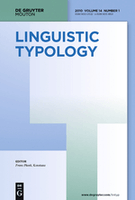
Linguistic Typology
Scope & Guideline
Charting New Territories in Language Typology
Introduction
Aims and Scopes
- Typological Analysis:
A core aim is to conduct typological analyses that explore the systematic features of languages, such as phonological, morphological, and syntactic structures. - Cross-Linguistic Comparisons:
The journal emphasizes cross-linguistic comparisons, providing insights into how different languages express similar concepts or structures. - Diachronic and Synchronic Studies:
Research in the journal includes both diachronic (historical) and synchronic (contemporary) studies, enriching our understanding of language change and stability over time. - Interdisciplinary Approaches:
The journal encourages interdisciplinary approaches, integrating findings from cognitive science, anthropology, and sociolinguistics to deepen the typological analysis. - Database and Resource Development:
Contributions often include the development of linguistic databases and resources, facilitating further research in typology.
Trending and Emerging
- Phonological Typology:
There is a growing interest in phonological typology, as evidenced by studies on phonotactics, consonant inventories, and sound change dynamics, indicating a shift towards understanding phonological structures in a cross-linguistic context. - Semantic and Syntactic Variation:
Research focusing on semantic and syntactic variation, especially in specific languages and language families, has gained traction. This trend highlights the importance of understanding how different languages express similar semantic concepts. - Cognitive and Cultural Influences on Language:
The exploration of cognitive and cultural influences on language structure and use is increasingly prominent, showing a trend towards integrating cognitive science perspectives into typological research. - Language Contact and Areal Typology:
Emerging studies on language contact scenarios and areal typology reflect an interest in how languages influence each other in specific geographical contexts, moving beyond traditional isolationist views. - Quantitative Methods in Typology:
There is a notable increase in the application of quantitative methods in typological research, allowing for more robust statistical analyses and comparisons across languages.
Declining or Waning
- Descriptive Grammars of Lesser-Known Languages:
There has been a noticeable decline in the publication of detailed descriptive grammars of lesser-known languages, which were previously more common. This shift may indicate a focus on broader typological analyses rather than individual language documentation. - Traditional Morphological Studies:
Research focused solely on traditional morphological categories has become less frequent, possibly due to an increasing interest in more complex and integrated approaches that examine morphology in conjunction with syntax and semantics. - Static Typological Classifications:
Static typological classifications that categorize languages into rigid groups without considering variability and change are waning. The journal now favors more dynamic and flexible frameworks that can accommodate language evolution.
Similar Journals
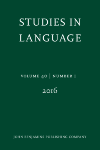
STUDIES IN LANGUAGE
Illuminating the Pathways of Language ResearchSTUDIES IN LANGUAGE is a distinguished academic journal published by John Benjamins Publishing Co, focusing on the dynamic fields of Linguistics and Communication. With an ISBN of 0378-4177 and E-ISSN 1569-9978, this journal has become an essential platform for researchers, professionals, and students seeking to advance their understanding of language and its multifaceted dimensions. The journal has been recognized in 2023 with a prestigious Q1 categorization in Linguistics and Language and a Q2 ranking in Communication, reflecting its vital contributions to these fields. Its Scopus rankings further emphasize its relevance, ranking 299 out of 1088 in Language and Linguistics, positioning it within the 72nd percentile. Published continuously since its inception in 1977, STUDIES IN LANGUAGE plays a pivotal role in disseminating cutting-edge research and fostering academic dialogue around contemporary linguistic theories and communication practices. While it is not an open-access journal, it offers valuable insights that make it a must-read for anyone committed to exploring the intricate relationships between language, culture, and society.

Linguistica Pragensia
Cultivating Excellence in Linguistic ResearchLinguistica Pragensia, an esteemed journal published by Charles University Prague, Faculty of Arts, serves as a vital resource in the field of linguistics and language studies. Since its inception, this open-access journal has fostered scholarly communication and exchange, promoting research excellence in various linguistic disciplines. Its international standing is reflected in its Q3 ranking in the 2023 category of Linguistics and Language and its strategic position within Scopus, boasting ranks in both Arts and Humanities and Social Sciences streams. The journal is committed to publishing innovative research from established scholars and emerging voices, contributing to the dialogue surrounding significant linguistic issues and developments. With its base in the culturally rich Czech Republic and an open-access model since 2015, Linguistica Pragensia remains a leading venue for researchers, professionals, and students seeking to engage with contemporary linguistic scholarship.

Language and Linguistics
Advancing Linguistic Knowledge for Tomorrow's ScholarsLanguage and Linguistics is a leading academic journal published by ACAD SINICA, INST LINGUISTICS, based in Taiwan. Established in 2008, this journal has rapidly gained recognition within the field of linguistics, achieving a commendable ranking of Q2 in the 2023 category quartiles and holding positions in the top percentiles of Scopus rankings for both Arts and Humanities and Social Sciences. With an ISSN of 1606-822X and an E-ISSN of 2309-5067, the journal aims to foster the development of linguistics research by providing a platform for the dissemination of innovative and interdisciplinary studies. While it currently operates on a traditional subscription model, its significant contribution to the advancement of linguistic theory and its applications makes it an invaluable resource for researchers, professionals, and students alike. Spanning converged years from 2008 to 2024, Language and Linguistics continues to shape the dialogue in understanding language phenomena and encourages submissions that push the boundaries of current linguistic knowledge.

SKASE Journal of Theoretical Linguistics
Fostering Collaboration in Theoretical LinguisticsSKASE Journal of Theoretical Linguistics, published by the SLOVAK ASSOCIATION STUDY ENGLISH-SKASE, is a distinguished Open Access journal that expands the horizons of linguistic research and theoretical frameworks. With its ISSN N/A and E-ISSN 1336-782X, the journal has established itself as a pivotal resource for scholars in the field, achieving a commendable Q2 ranking in Linguistics and Language as of 2023. The journal, which has been in continuous publication since 2017, actively publishes innovative research studies, reviews, and theoretical discussions, easing access to groundbreaking work for academics and practitioners alike. Based in Slovakia, it connects a rich heritage of linguistic scholarship and is indexed in Scopus, ranking alongside its peers in both Arts and Humanities and Social Sciences categories. The SKASE Journal of Theoretical Linguistics is crucial for anyone interested in the evolving landscapes of linguistics, serving as an invaluable platform for disseminating knowledge and fostering collaboration amongst researchers worldwide.
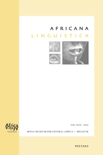
Africana Linguistica
Fostering Dialogue on African Language StudiesAfricana Linguistica is a premier journal dedicated to the exploration and analysis of linguistic studies concerning African languages and their dialects. Published by PEETERS, a highly regarded academic publisher, this journal aims to promote scholarly discourse and research on the diverse linguistic landscapes of Africa. With its emphasis on both theoretical and applied linguistics, Africana Linguistica serves as a vital resource for researchers, professionals, and students alike, facilitating the dissemination of groundbreaking research and fostering greater understanding of African linguistic heritage.
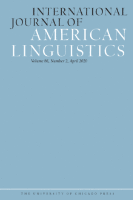
INTERNATIONAL JOURNAL OF AMERICAN LINGUISTICS
Delving Deep into Linguistic Structures and Nuances.The INTERNATIONAL JOURNAL OF AMERICAN LINGUISTICS, published by University of Chicago Press, is a revered scholarly publication dedicated to the exploration and advancement of linguistic studies, particularly those related to the American linguistic landscape. With an ISSN of 0020-7071 and an E-ISSN of 1545-7001, this journal serves as a vital platform for researchers, professionals, and students interested in the nuances of language, dialects, and linguistic structures through rigorous academic inquiry. The journal has established a commendable impact, reflected in its ranking within the Q2 category in Linguistics and Language and its placements in the Scopus rankings, thereby positioning itself within the 50th to 53rd percentile of its respective fields. While the journal does not provide Open Access options, it continues to be a cornerstone resource for those seeking to expand their understanding of American linguistics, already converging from 1996 to 2024. Through its continued commitment to excellence, this publication remains essential for those aiming to contribute significantly to the field.

Lingue e Linguaggio
Cultivating a Rich Discourse in Language and LinguisticsLingue e Linguaggio, published by SOC ED IL MULINO, is a distinguished academic journal in the field of Linguistics and Language, hailing from Bologna, Italy. With an esteemed Q2 ranking in its category as of 2023, this journal is recognized for its contributions to both the arts and humanities as well as social sciences, achieving notable positions within Scopus rankings. It serves as a vital platform for researchers, practitioners, and students interested in exploring various linguistic phenomena, language dynamics, and theoretical frameworks. Although it operates under a traditional subscription model rather than open access, its comprehensive array of studies and publications provides significant insights and fosters academic discourse. With a publication period extending from 2002 to 2024, Lingue e Linguaggio continues to be a key resource for advancing the understanding of language in contemporary contexts.
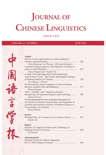
JOURNAL OF CHINESE LINGUISTICS
Pioneering Research in the Heart of Chinese Language StudiesJOURNAL OF CHINESE LINGUISTICS, published by the JOURNAL CHINESE LINGUISTICS, is a prominent periodical that serves as a vital resource for researchers and scholars in the fields of linguistics and Chinese studies. With its ISSN 0091-3723, this journal has been contributing to the academic community since 1996 and continues to publish innovative research until 2024. Although it is classified in the third quartile (Q3) for both Arts and Humanities and Linguistics categories, its focus on Chinese linguistics positions it uniquely within this specialized domain. The journal is committed to advancing the understanding of Chinese language structures, usage, and context, encouraging interdisciplinary dialogue among linguists and language researchers. While currently not labeled as open access, the journal remains accessible to institutions and scholars worldwide, creating an invaluable platform for disseminating knowledge. As such, it plays a critical role in promoting linguistic diversity and cultural awareness within the academic landscape.

Jezikoslovlje
Championing Scholarly Excellence in LinguisticsJezikoslovlje, published by the Josip Juraj Strossmayer University, Faculty of Philosophy in Croatia, is an essential publication in the field of Linguistics and Language Studies. Launched in 2008 and extending its contributions to the academic community through 2024, this journal addresses a spectrum of linguistic research, facilitating scholarly dialogue around both theoretical and applied aspects of language. With a current Scopus ranking placing it in the 54th percentile in the Arts and Humanities and the 50th percentile in Social Sciences, Jezikoslovlje serves as a vital resource for researchers and students looking to engage with contemporary linguistic issues. Although it operates under a traditional access model, its indexed presence and rigorous peer-review process ensure that published works maintain a high scholarly standard, inviting contributions that advance understanding in this dynamic discipline. The journal's commitment to fostering knowledge in linguistics makes it a significant platform for academics in Croatia and beyond.
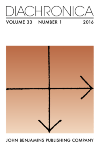
Diachronica
Advancing Understanding in Diachronic LinguisticsDiachronica is a prestigious academic journal published by John Benjamins Publishing Co that specializes in the fields of Linguistics and Philosophy. Established in 1984, it has become a significant platform for researchers and scholars to disseminate their work on language change and diachronic linguistics, offering insights into the evolution of languages over time. With an impressive impact factor and recognized rankings within the Q2 category for both Linguistics and Language as well as Philosophy in 2023, Diachronica offers a valuable resource for academics interested in the interplay between historical linguistics and philosophical discourse. Although the journal is not open access, it ensures that its articles are rigorously peer-reviewed and of high academic quality. For researchers, professionals, and students looking to deepen their understanding of language dynamics, Diachronica stands out as an essential component of the scholarly dialogue surrounding linguistic change.